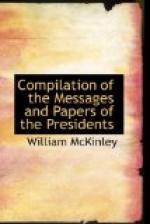Whatever the nation does for the extension of irrigation should harmonize with, and tend to improve, the condition of those now living on irrigated land. We are not at the starting point of this development. Over two hundred millions of private capital has already been expended in the construction of irrigation works, and many million acres of arid land reclaimed. A high degree of enterprise and ability has been shown in the work itself; but as much cannot be said in reference to the laws relating thereto. The security and value of the homes created depend largely on the stability of titles to water; but the majority of these rest on the uncertain foundation of court decisions rendered in ordinary suits at law. With a few creditable exceptions, the arid States have failed to provide for the certain and just division of streams in times of scarcity. Lax and uncertain laws have made it possible to establish rights to water in excess of actual uses or necessities, and many streams have already passed into private ownership, or a control equivalent to ownership.
Whoever controls a stream practically controls the land it renders productive, and the doctrine of private ownership of water apart from land cannot prevail without causing enduring wrong. The recognition of such ownership, which has been permitted to grow up in the arid regions, should give way to a more enlightened and larger recognition of the rights of the public in the control and disposal of the public water supplies. Laws founded upon conditions obtaining in humid regions, where water is too abundant to justify hoarding it, have no proper application in a dry country.
In the arid States the only right to water which should be recognized is that of use. In irrigation this right should attach to the land reclaimed and be inseparable therefrom. Granting perpetual water rights to others than users, without compensation to the public, is open to all the objections which apply to giving away perpetual franchises to the public utilities of cities. A few of the Western States have already recognized this, and have incorporated in their constitutions the doctrine of perpetual State ownership of water.




